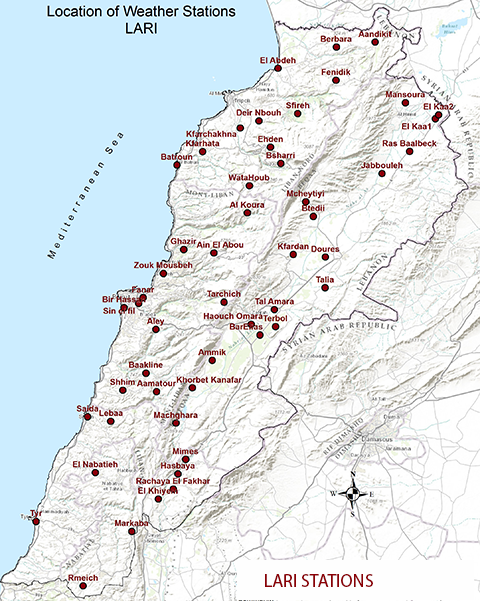History
Government Research for improving production in Lebanon dates back to the establishment of Tel Amara Station in the Bekaa Valley immediately after World War II as an agricultural training center. Later, in 1957, it became the Department of Agricultural Scientific Research of the Ministry of Agriculture. Other stations were established at Tourbol (Bekaa) for animal production, Abde (North) and Sour (South) for citrus.
In 1964, the Department of Agricultural Scientific Research was reorganized as an autonomous public institution and became the Lebanese Agricultural Research Institute (LARI) working under the supervision of the Minister of Agriculture. More research stations were established at Fanar (Mount Lebanon) for animal health and agriculture, at Kfarshakhna (North) for soil, irrigation and farm machinery research. Both Tourbol and Kfardane were later, in the late seventies, handed over to the International Center for Agricultural Research in the Dry Areas (ICARDA).
About LARI
LARI has at its disposal eight experimental stations (Tel Amara, Tourbol, Kfardan, Kfarchakhna, Abdeh, Sour, Fanar, Lebaa) in an area of 280 hectares of agricultural land.
The stations are located in agricultural areas where subtropical and temperate corps are produced. In These stations research projects are conducted to solve problems facing the agricultural sector in this area.
The Lebanese Agricultural Research lnstitute is eager to recruit new qualified personnel and attract more financial support in order to face future challenge.
International agencies such as FAO. UNDP and ICARDA who sponsored the institute Eviction in the past an CxteCtea tO COntaInS thor sponsored for the local and regional development, and progress.
Cooperative relation emphasizes all possible ways to accomplish better research results and expand to areas not well covered, presently. There exist excellent cooperation with international organization (ICARDA, FAO. UNDP. ISNAR. CIHEAM. IPGRI, UPOV, World, Bank, AARINENA. IDRC. CIMMYT, ACSAD. etc..). Bilateral cooperation with developed countries and TCDC also are evident in the Lebanese agricultural system.
Research findings are directly transferred to the farming community in the following areas: Cereals, Root crops, Pastures, Grain legumes, veterinary medicine, plant nutrition and pest management. Hybrid seed, Tissue culture and biotechnology output are also reaching the farmer via the multi-channel system available in The country (public and private institutions, and the private sector).
Our Mission
LARI is a governmental organization under Minister of Agriculture Supervision with a budget of 15 Million Dollar.
lari@lari.gov.lb
08 900 047
The institute conducts applied and basic scientific research for the development and advancement of the agricultural sector in Lebanon.
In addition, the Institute keeps close ties to the farmers and tries to develop research activities aiming at solving their problems.
Weather Stations

Distribution of Automated AgroWeather Stations Network of LARI overall the Lebanese territory.
